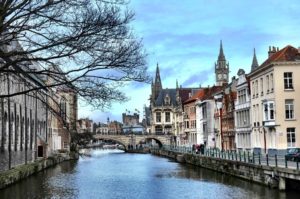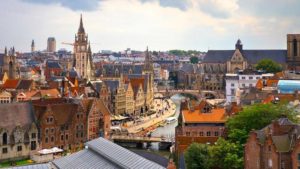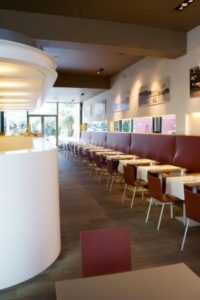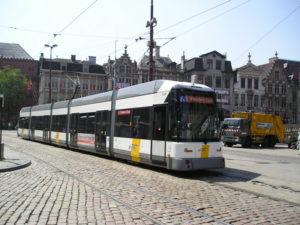I thought that staying near the Brussels airport after close to a week in Flanders was a smart move. I was going to do serious sight-seeing in Ghent and Antwerp and had been to Brussels several times before. By the time I got to Brussels, I would be tired and all I’d want was a comfortable place to repack my bags, snooze, and have a last good meal.
I did not expect riot police.
But here’s what happened first:
No one at the hotel told me that the “few minutes” from the train station closest to my hotel were all uphill and also involved a couple of staircases connected to a highway underpass, followed by more uphill schlepping of my roll-aboard. Then the check-in clerk took my reservation for a 4AM airport shuttle the next morning but didn’t inform me that my room rate included a breakfast bag—I found out what I was missing from other riders en route to Zaventem Airport when it was too late.
My room hadn’t been dusted well, but then neither was the hotel restaurant, which also had a chunk missing from the wall near where I had a meal. Maybe a hungry diner had taken a bite out of it while waiting—my dinner took way too long to arrive, even by European standards. But I figured the good wine I drank would knock me out for a few hours of sleep.
I woke near midnight wondering if climate change had somehow made Belgium prone to earthquakes, because my bed and the walls were shaking.
It took me a minute to realize the culprit was thumping bass from a party somewhere in the hotel. The noise only got worse and I knew sleep wasn’t an option. Sitting down at the desk to catch up with email, I could feel my chair practically move with the beat of the one song whose lyrics I could make out: “Sweet Dreams Are Made of This.”
[Insert ironic comment here]
I was more than happy to leave, but when I got to the lobby at 3:45am, I found it filled with Belgian police in their distinctive bilingual vests.
Police cars were parked outside as if this were a crime scene. One cop in the lobby was wrestling with a drunken shouting woman he was trying to eject from the hotel. Other young revelers in tuxes and short sequined dresses were loitering drunkenly in the lobby and outside. One couple fled from an elevator as if being chased by the zombies in World War Z.
I asked a policeman in French what had happened and he said there had been a “fight” and was reluctant to say anything else. In all the confusion and clamor, there was only one man at the hotel desk, and the police seemed to be lined up partly to prevent the counter from being stormed.
I’ll never know all the details of what happened, but the chaos was a gift: For writers, everything is material.
Lev Raphael has been to Europe many times. He speaks French, German, and some Dutch. He’s the author of 26 books including the memoir/travelogue My Germany and most recently State University of Murder. He teaches creative writing workshops online at writewithoutborders.com.




